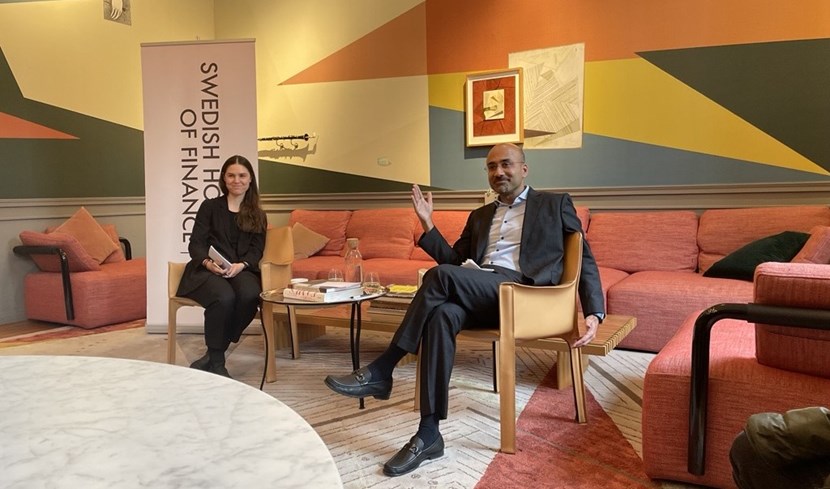When Borrowing Fails: The Risks of Unproductive Debt in Modern Economies
May. 27, 2025
What happens when borrowing no longer fuels growth but deepens economic fragility? At a Fireside Chat hosted by the Swedish House of Finance (SHoF), Princeton professor Atif Mian presented a thought-provoking analysis of the post-2008 global economy. Drawing from his book The House of Debt, Mian argued that the financial crisis never truly ended, as debt-driven growth, rising inequality, and declining public investment continue to undermine long-term stability. The talk was moderated by Paula Roth, researcher at SHoF.

The Great Recession and Its Aftermath
While Atif Mian’s research focuses primarily on the U.S. However, it extends beyond the U.S., examining similar patterns in other countries. In the discussion he argued that while financial markets recovered and surface-level indicators improved, the deeper structural imbalances that triggered the crisis, such as rising debt levels, inequality, and weak investment, were never fully resolved.
“I realize it more and more, that the forces that led up to the 2008 recession and crisis, they very much remain with us,” he said.
He described the unusual nature of the recession, where unemployment soared without a clear external shock like war or disaster. Instead, the downturn stemmed from a financial system heavily reliant on private debt to sustain aggregate demand. Easier lending terms encouraged households to borrow more, especially for housing, fueling both consumption and rising home prices.
“There was a positive feedback loop between debt and asset values: as housing prices rose, borrowing increased, which in turn pushed prices higher,” he said and explained that when this debt-fueled model broke down, it triggered a prolonged period of economic stagnation.
“It’s like kicking the can down the road,” he remarked, highlighting how temporary fixes have failed to address deeper vulnerabilities. “And that has led us to deeper, long term problems.”
Productive vs. Unproductive Debt
Mian drew a distinction between productive and unproductive debt, noting that only the former supports investments with long-term returns. He argues that rising financial surpluses have driven a shift toward unproductive debt, creating an unsustainable economic path. As interest rates have been lowered to manage these imbalances, their effectiveness has diminished. Mian stresses that addressing structural issues behind recession and inequality requires a renewed focus on genuinely productive investments.
Structural Issues and Inequality
Considering the deeper structural forces behind the 2008 financial crisis and its aftermath Mian highlighted the dangers of debt-driven growth, the concentration of wealth, and the limits of conventional policy responses. To build a more resilient and equitable economy, he called for productive investment, risk-sharing mechanisms, and coordinated policy reforms.
He concluded that the post-2008 shift from private to public debt, driven by large fiscal deficits, reflects deeper structural problems. He pointed to growing financial surpluses among the wealthy, corporations, and sovereign wealth funds, which are funneled into the financial sector rather than the real economy. Understanding these imbalances, he argued, is key to addressing both the roots of the recession and the rise in inequality.
Policy Responses and Risk Sharing
Mian argued that traditional tools like monetary policy failed to counter the collapse in private debt-financed spending during the 2008 crisis. Lower interest rates had little effect, especially among wealthier creditors unlikely to boost spending. He emphasized that debt amplifies financial stress, particularly when risk is not shared between creditors and debtors, leaving borrowers to absorb the shock. To reduce inequality and promote productive investment, Mian called for better risk-sharing mechanisms, wealth taxes, and dynamic scoring of public spending.
“Even if you ignore all the taste-based arguments, there’s a macroeconomic case: risk sharing really matters for the functioning of the overall economy,” Mian concluded. “If you want to avoid recessions and huge declines in real value, risk sharing really matters. Because we are all connected.”
